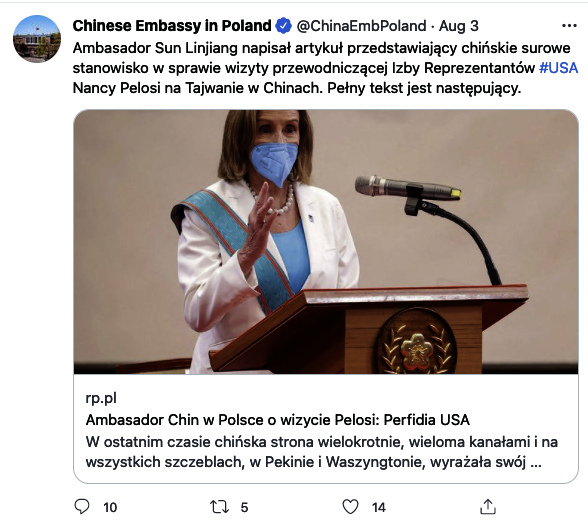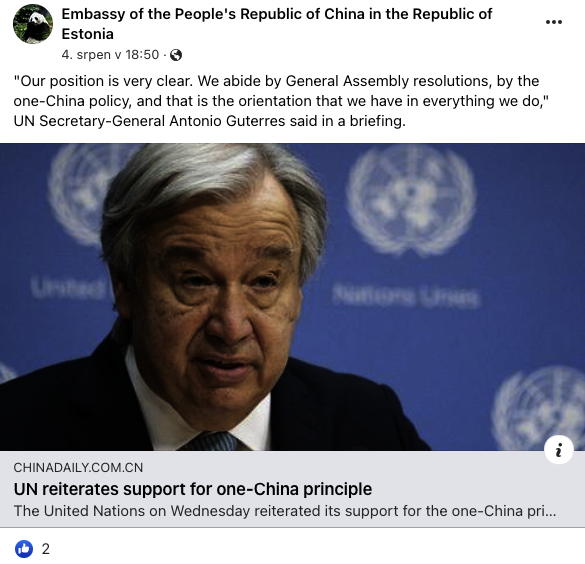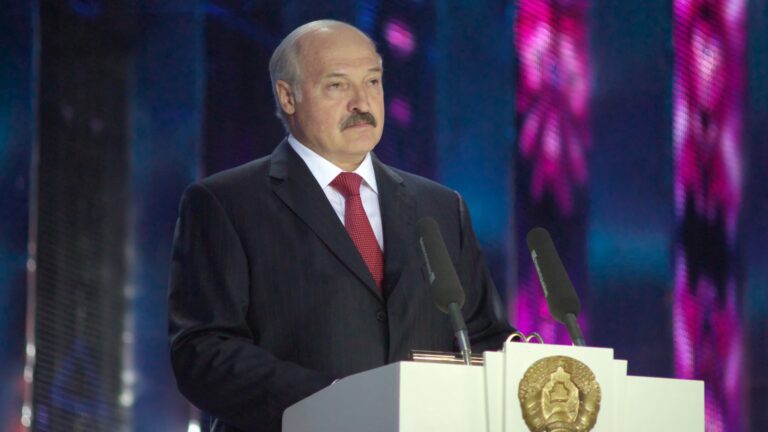
The visit of the Speaker of the US House of Representatives Nancy Pelosi to Taiwan in August was followed not only by heightened tensions in the Taiwan Strait, as China reacted by announcing military exercises, but also increased efforts of Chinese diplomats and media to frame the visit in Beijing’s optics to the global audience. CHOICE assembled a group of experts to analyze Chinese narratives on Pelosi Taiwan’s visit targeting the publics in eight EU and NATO countries in Central and Eastern Europe. Their assessment of Chinese information efforts, from July to August 12, is available below.

Ivana Karásková (@ivana_karaskova)
Founder of CHOICE and MapInfluenCE projects & China Research Fellow at Association for International Affairs (AMO), Czech Republic
Similarly to Chinese messaging on the war in Ukraine in Central and Eastern Europe, the Chinese embassy in the Czech Republic opted for a limited reaction to Pelosi’s visit to Taiwan. Instead, it was the Chinese media publishing in Czech, which carried the most vitriolic messaging as well as local fringe media outlets, which acted as amplifiers of the Chinese narratives.
The website of the Chinese embassy in Prague published just three inputs in English, all concerning the newly released White Paper on Taiwan. In Czech, the embassy published one comment prepared by its spokesperson on August 5, framing Pelosi’s visit as a provocation and proof of the alleged US hypocrisy. Chinese reaction, on the other hand, was described as defensive and legitimate. Additionally, the embassy commented on the visit of You Si-kun, the President of the Taiwan’s Legislative Yuan, calling him “a staunch separatist.” You visited Prague in July at the invitation of Miloš Vystrčil, the President of the Czech Senate.
The embassy’s social media accounts remained equally silent. The embassy’s Twitter account did not share any unique content on the issue, settling for reposts of the Chinese media and the Chinese Foreign Ministry spokespersons’ statements. Its Facebook account continued to share arts, travel and technology-related content. Specifically on Taiwan, it shared the embassy spokesperson’s comment and the video by the China Daily explaining China’s position on Taiwan. The posts did generate some engagement, yet mostly in the form of mocking the embassy.

Despite the embassy’s constraint, the Chinese narratives managed to reach the local public through various means, including via the China Radio International (CRI) and local fringe websites. The Czech language version of CRI carried multiple (anonymous) commentaries and cartoons on its website and Facebook account, criticizing the visit. One article hinted at the alleged deficiencies of Nancy Pelosi and her family members’ character.
While the Chinese official media’s engagement in spreading the official narratives is understandable, the involvement of local fringe media deserves more attention. Some media used a copy-paste technique and simply ran the Chinese embassy’s statements as separate articles. For instance, Infokurýr, a disinformation media outlet connected to Russian propaganda, published a statement by the Chinese embassy spokesperson on Pelosi’s visit to Taiwan. The same statement, but carrying the byline of a Czech person, appeared in Naše Pravda, a Czech Communist party-related weekly. Other media were more innovative, adding a few lines of original writing to the full statement. The resulting article appeared to be an op-ed written by a local commentator, disguising the origin of the majority of the article.

Alicja Bachulska (@a_bachulska)
China analyst at Asia Research Centre at War Studies University in Warsaw & regional analyst for Poland at the MapInfluenCE project, Poland
In Poland, both Chinese diplomats and state-affiliated media activated the same channels as used during previous crises, such as the Hong Kong protests or Russia’s invasion of Ukraine. In reaction to Nancy Pelosi’s visit to Taiwan, the Chinese Ambassador to Poland, Sun Linjiang, published three articles in Rzeczpospolita (a renowned centrist daily), Onet (a popular online news portal) and Trybuna (a fringe outlet with roots in the pre-1989 political system).
All three pieces reiterated the same arguments. Firstly, they claimed that Pelosi’s trip was a “brazen interference in China’s domestic affairs” and a “violation of China’s sovereignty and territorial integrity.” Secondly, their tone was extremely anti-American, with the ambassador calling the visit an example of “the US perfidy.” Finally, all three pieces included an instruction for the Polish government to “recognize the wrongness and harmfulness of Pelosi’s visit to Taiwan” and “take the right side in this important issue by supporting the PRC’s side.”

Interestingly, Trybuna marked the ambassador’s piece as “sponsored content,” while two other outlets labeled it as “opinion.” Moreover, for the first time in recent years, the pieces did gain some traction in the public debate, with several other outlets pointing out the problematic nature of the ambassador’s op-eds. For example, state-run TVP Info expressed veiled criticism of these pieces appearing in other media, while the right-wing weekly Gazeta Polska singled out the role of Rzeczpospolita’s editor in chief, Bogusław Chrabota, in allowing this kind of articles to be published.
Simultaneously, Taiwan’s representative in Poland, Bob L.J. Chen, was also quick to respond. On August 9, his own op-ed appeared in both Rzeczpospolita and Gazeta Wyborcza (another popular daily), urging Poland and other like-minded countries to support Taiwan in the face of Beijing’s coercion.
Last but not least, China Radio International (CRI) Poland also engaged in criticizing Pelosi’s visit, with multiple commentaries and caricatures published throughout early August on its website and Facebook account.
Anecdotal evidence suggests, however, that the more anti-American CRI’s content has been, the more organic backlash it has received, with users ridiculing it for being crude and reminiscent of Soviet-era propaganda.

Matej Šimalčík (@MatejSimalcik)
Executive director at Central European Institute of Asian Studies (CEIAS) & regional analyst for Slovakia at MapInfluenCE project, Slovakia
In Slovakia, pro-China messaging on Pelosi’s Taiwan visit was promoted by the usual suspects, not only the Chinese embassy but also by local disinformation websites. Local diaspora organizations were mobilized as well to showcase support for the motherland.
Chinese ambassador to Slovakia Sun Lijie released an article promoting the Chinese narrative on Pelosi’s visit, labeling it a “shameless provocation” that violates the ‘One-China Principle.’ Naturally, in Sun’s view, USA and “Taiwanese authorities” were to be blamed for the crisis. The US is painted as an unreliable partner that “says one thing and does another.” The article was published by fringe leftist portal Nové slovo. While the article was promoted on both the embassy and Nové slovo social media, it gained only very little traction.
The embassy also published a statement of the 17 diaspora organizations which exhibit close links to the United Front system. In the “solemn statement,” the diaspora organizations “support a series of powerful measures and actions taken by the Chinese government to safeguard national sovereignty and territorial integrity.” Even though the statement was published only in Mandarin, it is still a rather important development, as previously diaspora was mobilized only rarely to promote external propaganda on China’s ‘core interests’.
Though neither the Chinese embassy in Slovakia nor Chinese media were very active in reaction to the visit, Pelosi’s trip received coverage by the Slovak alternative media, which are habitually US-skeptic. Yet, the discourse promoted by them was not completely China-positive and critical statements did also appear. However, most of the coverage prior to the visit focused on the preemptive warnings by Beijing. Lack of unity between Pelosi and Biden administration was noted and interpreted as a sign of US weakness. Disinformation media also eagerly reported on Kremlin’s support for the Chinese claim to Taiwan and its hostile reaction to Pelosi’s visit.
An article reprinted from the Czech server Aeronet claimed that Pelosi’s visit aims to start a new proxy war from which the US would benefit. The article further speculated about the probability of a Chinese invasion of Taiwan, claiming that Xi Jinping has only two options, either to attack Taiwan or resign, since relying on jingoistic narratives has limited his options. This highlights the existing interconnectedness of Slovak and Czech disinformation scenes. As a result, disinformation published by Czech alternative media can freely flow to Slovakia (and vice-versa).
Despite the effort, China’s attempts to promote its views on Pelosi’s visit did not receive much traction among the general public and failed to garner support from the mainstream media. This is largely due to the recent unprecedented crackdown on the Slovak disinformation scene by the Slovak government as well as social media operators who blocked the most popular disinformation websites in light of Russian aggression against Ukraine.

Réka Koleszár (@RekaKoleszar)
Graduate student at University of Groningen & student at European Academy of Diplomacy, Hungary
In Hungary, Nancy Pelosi’s visit came amid considerable local turbulences. Her visit received some attention but did not take the central stage.
Hungarian state-affiliated media mainly echoed China’s perspective, often quoting Chinese officials’ criticism of the visit. Most articles repeated China’s core talking points regarding Taiwan and some took a markedly anti-American stance. A Hungarian translation of Russian Foreign Minister Sergey Lavrov’s opinion made it to local media, while European and American comments were markedly missing in the local discourse.
In his Facebook post, Tamás Menczer, a Spokesman of the Hungarian Foreign Ministry, emphasized that Hungary consistently adheres to the One China Principle (sic!) and hopes that the Taiwan situation would not escalate. The post was shared by the Chinese Embassy’s Twitter account conveying China’s ‘deep appreciation of Hungary’s commitment.’
Besides, the embassy made a handful of posts both on its Twitter and Facebook accounts concerning the visit, but they did not receive much engagement. On August 11 a longer article by the spokesperson of the embassy appeared, titled: “He who plays with fire will burn himself, the general trend is irreversible.” It stated that no-one can underestimate the will of the Chinese government and the Chinese people to defend their national sovereignty and territorial integrity, highlighting that the general trend of Taiwan coming under China’s rule is irreversible.
The latest official exchange between Hungary and China took place on July 17 in the form of a phone call between Foreign Minister Wang Yi and his Hungarian counterpart Péter Szijjártó at the latter’s request. The Chinese readout of the exchange highlighted that “China believes that Hungary will continue to uphold an objective and just position and push the European Union (EU) to adopt a positive and pragmatic policy toward China.”
Overall, as has been noted before, the coverage by China-friendly government’s mouthpieces makes it not necessary for China to actively spread its propaganda in the country.

Vida Macikenaite (@VidaMaci)
Assistant Professor at the Graduate School of International Relations, International University of Japan, Lithuania
In Lithuania, China’s messaging on Nancy Pelosi’s trip to Taiwan was mostly reactive and came from China’s Office of the Chargé d’Affaires which replaced the Chinese Embassy after a diplomatic spat last year.
In July, the first official comments were published on the website of the Office in response to the visit by You Si-kun, the head of Taiwan’s Legislative Yuan, to Lithuania. Later, two comments followed. The first focused on the so-called “erroneous remarks on Taiwan” made by Foreign Minister Gabrielius Landsbergis. A week later, an additional comment on “the erroneous remarks on Taiwan by Seimas Speaker Viktorija Čmilytė-Nielsen and Foreign Minister Gabrielius Landsbergis” followed. Both texts were published on the website in direct response to statements supporting Nancy Pelosi’s visit to Taiwan.
In all three pieces, the attention focused on the impact of the visit on bilateral China-Lithuania relations. Yet the last comment adopted a stronger tone warning that “China will not sit idly by the provocative behavior of the relevant personnel of Lithuania.” Otherwise, communication from the Chinese side on Taiwan has been limited to sharing statements and documents originating in Beijing.

China’s Office of the Chargé d’Affaires in Lithuania posted the white paper on the Taiwan Question on its website and its Twitter account. The account has been flooded by Taiwan-related posts since the start of the month until at least August 12, when a post announced sanctions on the deputy minister of transport of Lithuania in response to her visit to Taiwan. Many of the posts re-shared Chinese foreign ministry spokesperson’s remarks relevant to Taiwan, often reiterating China’s position and pointing out the perceived wrongdoing by the US.
Notably, the comments on the official website of the Office of the Chargé d’Affaires, as well as the posts on its Twitter account, were published in English and to a lesser extent Chinese, but not in Lithuanian, failing to engage Lithuanian the audience. As a result, China’s messaging on Taiwan in the Lithuanian information space can be considered to be minor.
In Lithuanian media, China’s voice appears to have been limited to a single report by major news outlets on BNS interview with China’s acting Chargé d’Affaires in Lithuania Qu Baihua, where he warned that any visit to Taiwan by any country officials “violates the One China principle” and called to refrain from such visits in the future.

Liisi Karindi (@KarindiLiisi)
Business developer and government advisor, Estonia
The Chinese Embassy in Tallinn conveys its messages to the local public through three main channels: the official website, its Facebook page as well as its Twitter account. The content mostly consists of reposts of statements by the Chinese Foreign Ministry and articles published by China Daily and Xinhua.
The first Taiwan-related reposts appeared on the embassy’s Facebook and Twitter accounts on August 3: one was the statement by China’s Ministry of Foreign Affairs on Nancy Pelosi’s visit to Taiwan and the other one was an article with Wang Yi’s remarks on the same issue. On August 4, an article on the UN’s position was posted on the same channels to emphasize the organization’s support for the One China principle. On August 7, Wang Yi’s press conference statement was shared on all three channels, followed by the news concerning the release of a white paper on the Taiwan question on August 10. On Facebook, the embassy has additionally reposted two articles on the background of the “1992 Consensus” concerning the cross-strait relationship.

As can be seen from the posts, the Chinese Embassy in Tallinn has made no effort to produce any targeted, localized messaging on Taiwan to the Estonian public. Taking into account the extremely limited reach of these channels, most news posted usually go unnoticed. However, an exception was the news on the release of a white paper on the Taiwan question which made it into the evening news program “Aktuaalne kaamera” by the Estonian Public Broadcasting ERR.
However, a more targeted response from the embassy should be expected if the suggestion to establish a Taiwanese representative office in Estonia materializes.

Una Bērziņa-Čerenkova (@UCerenkova)
Head of the Asia program at Latvian Institute of International Affairs, Latvia
In line with the previous approach of the Chinese embassy in Latvia, seen on the case of messaging on the war in Ukraine, there has been little original messaging in Latvian surrounding Nancy Pelosi’s visit to Taiwan. The embassy website has actively republished several materials prepared by the Chinese Foreign Ministry and State Council regarding Taiwan in English, including an article titled “The Taiwan Question and China’s Reunification in the New Era” by the Taiwan Affairs Office.
From the beginning of July until August 12, there were no op-eds published in the online media outlet Neakarīgā Rīta Avīze, which regularly publishes interviews with the Chinese ambassador. An op-ed titled “The Attempt to Play the Taiwan Card in Doomed to Fail” in Latvian with a headnote “paid by the Embassy of the PRC in Latvia” appeared in print in the Diena newspaper on August 10. The op-ed has not featured in the English version of the embassy’s website. However, it was translated into Chinese and uploaded to the Chinese version of the website, signaling that the target audience for the commentary is Chinese rather than Latvian or English speaking. The article is generic, without any Latvia-related content. Perhaps unsurprisingly, it focuses mostly on criticism of the US.
The Facebook page of the embassy also failed to provide any content on Taiwan put into local context. Yet, it contains some translations of statements by the Chinese Foreign Ministry into Latvian, as well as reposts of English content. The translations have not attracted interest from the local public and no interaction with the wider public in the commentary section appears to take place.

Tinkara Godec (@tinkarag)
MA student of Economy and Society of East Asia, University of Vienna & events officer at the Student Think Tank for Europe-Asia Relations (STEAR), Slovenia
Chinese messaging on Taiwan in Slovenia, although more prominent than messaging on Ukraine, has been quite subdued. The Chinese embassy published three articles on the topic, all of them reposts of official statements by China’s Foreign Ministry and the Taiwan Affairs Office. The embassy was more active on Twitter, posting on Taiwan daily. Yet the activity again focused only on reposting Chinese government officials and propaganda releases. Perhaps surprisingly, there were no tweets or posts in the Slovenian language on both the embassy’s Twitter account and its website. Chinese efforts thus generated low interest and engagement from the Slovenian population.
There are no news outlets that act as explicit pro-China mouthpieces in Slovenia. Yet, some can be characterized as being more China-friendly, such as the left-leaning newspaper Dnevnik (The Daily), which published the op-ed authored by the Chinese Ambassador to Slovenia Wang Shunqing. The op-ed, titled “The One China principle is the prerequisite and foundation of foreign relations” was published on August 6. It summarized China’s official tropes, such as that Taiwan has always been a part of China, that it was discovered and populated by the Chinese and that numerous international treaties affirm that. In the last paragraph, the op-ed turned to the Slovenian public. Ambassador Wang appealed: “Slovenia understands the error and serious damage of Pelosi’s visit to Taiwan” and “it will continue to respect and observe the One China Principle and cooperate with China in promoting the development of Sino-Slovenian relations, thus bringing more benefits to the people of both countries.” The issue, however, has not raised any interest in Slovenia and Dnevnik did not run the op-ed on its social media accounts.

Apart from the op-ed and tweets by the Chinese embassy, a local China researcher Uroš Lipušček supported the Chinese narrative in an interview, when he expressed his view saying that “Taiwan is an integral part of China, which was also recognized by the US in 1972.” He also stressed that the question of how Taiwan is to be integrated into the People’s Republic of China is an internal issue.
To sum up, the issue did not generate significant interest in Slovenia’s media space. Likewise, China apparently lacks interest in messaging on Taiwan and related topics to the local population.
Written by
CHOICE
CHOICE is a multinational consortium of experts providing informed analysis on the rising influence of the People’s Republic of China within the countries of Central and Eastern Europe (CEE).


